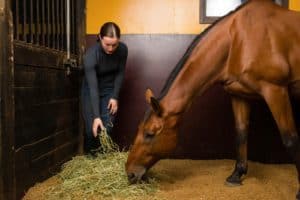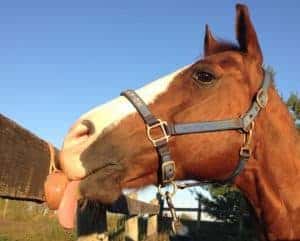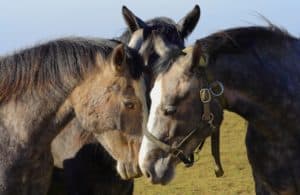
Trace Mineral Basics: Selenium
Selenium is required in very small amounts in the equine diet, but it has an important role in maintaining horse health.

Selenium is required in very small amounts in the equine diet, but it has an important role in maintaining horse health.

Up to 93% of performance horses suffer from gastric ulcers. Is yours one of them? Here’s how to manage the condition.

Tips include ensuring constant forage access, providing pasture turnout, and limiting concentrate intake, among others.

What do probiotics and their counterparts–prebiotics–do for horses? Here’s what the current research says.

Cobalt is required in very small amounts in the equine diet.

Learn more about these trace minerals that are vital to horse health.

My filly is licking and biting her salt block obsessively. Is it possible for her to eat too much salt?

A nutritionist can tell you if you’re over- or underfeeding or supplementing and address other equine diet concerns.

Researchers are looking at how diet might influence how horses respond to stress and disease.

Allergies are common in horses. Here’s a look at how veterinarians and owners can identify the causes.

Several ingredients claim to help equine gastric ulcers, but only a few have research behind them.

Laminitis risk is the No. 1 reason we worry about equine metabolic conditions such as EMS and PPID when feeding horses.

Contributor Nettie Liburt’s gelding presented with glaucoma and was finally diagnosed with intraocular hypertension.

Hormone concentrations can help diagnose reproductive problems, determine pregnancy status, and more.

Researchers are learning more about how microbes within the gut influence horse health.

Horses with noninfectious respiratory disease had much lower SAA concentrations than horses with infectious disease.
Stay on top of the most recent Horse Health news with
© 2022 Copyright Statement dolor sit amet, consetetur sadipscing User Terms, sed diam nonumy eirmod tempor invidunt ut labore et dolore magna aliquyam erat, sed diam voluptua. At vero eos et accusam et justo duo dolores et ea rebum. Stet clita kasd gubergren, no sea takimata sanctus est Lorem ipsum dolor sit amet.